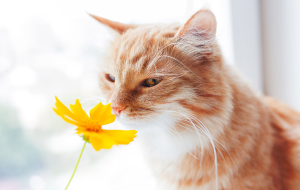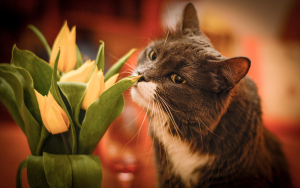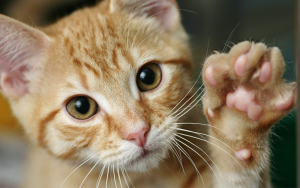Why Is My Cat Eating Cockroaches? Understanding Your Cat’s Behavior and How to Stop It

Introduction: The Unusual Diet of Cats
If you’ve ever caught your cat munching on a cockroach, you’re not alone. Many cat owners have observed their feline companions hunting and eating insects, particularly cockroaches. While this may seem strange or even concerning, it’s a behavior that
is rooted in their natural instincts. In this article, we will explore the reasons why cats may eat cockroaches, whether it’s safe for them to do so, and how to prevent this behavior if it’s causing concern.
1. The Natural Instincts of Cats: Why Do Cats Hunt and Eat Insects?
Cats are natural predators. Even domesticated cats that receive regular meals still have hunting instincts that drive them to chase and catch small creatures. In the wild, these instincts would have been essential for survival, as cats rely on hunting
to catch their food.
Cats, regardless of whether they live in a home or roam freely outdoors, often exhibit the following predatory behaviors:
- Chasing: Cats are quick to chase any small moving object, including insects.
- Pouncing: Once they’ve caught sight of a potential prey, cats instinctively pounce on it.
- Nibbling or Eating: Once the prey is captured, it is often eaten, especially if the cat feels it is hungry or if the prey is small enough to consume.
Cockroaches are just one of the many insects that can trigger this hunting response. Their quick movements and small size make them an ideal target for a cat’s natural hunting abilities. In fact, cockroaches are a common target for both indoor and outdoor
cats.
2. Is It Safe for Cats to Eat Cockroaches?
As a cat owner, it’s important to consider whether eating cockroaches is harmful to your cat. While cats may be naturally inclined to hunt and eat insects, there are several potential risks to be aware of:
-
Pesticide Exposure: One of the biggest concerns is the use of pesticides in your home. Cockroaches that have been exposed to these chemicals can carry harmful toxins that could make your cat sick if consumed. Symptoms of poisoning
may include vomiting, diarrhea, or lethargy. If you use pest control products, make sure they are pet-safe and avoid letting your cat eat insects that may have been exposed to harmful chemicals.
-
Bacterial Infections: Cockroaches can carry bacteria such as Salmonella or E. coli. While cats have relatively strong immune systems, ingesting bacteria from cockroaches can lead to gastrointestinal upset or more severe health
issues.
-
Parasites: Cockroaches are known to carry various parasites, including worms or protozoa, which can be transmitted to your cat if consumed. These parasites can lead to health problems such as digestive disturbances or more serious
conditions that require veterinary intervention.
-
Choking Hazard: While not a common issue, there is a risk that your cat could accidentally choke on a cockroach, particularly if the insect is large or the cat tries to swallow it too quickly.
3. Can Eating Cockroaches Be a Sign of Hunger or Nutritional Deficiencies?
While it is natural for cats to eat insects, some pet owners may worry that their cat is eating cockroaches out of hunger or a lack of proper nutrition. This is a valid concern, as a cat’s behavior can sometimes be linked to their diet. Here are some
factors to consider:
-
Hunger: If your cat is not getting enough food, it may be more likely to hunt and eat insects. Make sure you are providing your cat with a balanced and nutritious diet that meets their specific needs. If your cat is consistently
hungry, they may look for alternative sources of food, including insects like cockroaches.
-
Nutritional Deficiencies: Cats are obligate carnivores, which means they require a diet that is high in animal protein. If your cat’s food is lacking in essential nutrients such as taurine, a vital amino acid, they may seek out
additional protein sources, including insects. Ensure your cat’s food contains the proper balance of nutrients.
-
Boredom or Stress: Cats that are bored or stressed may engage in unusual behaviors, including hunting insects. If your cat is not receiving enough stimulation, mental engagement, or physical activity, they may resort to hunting
and eating cockroaches or other insects as a way to pass the time.
4. How to Prevent Your Cat from Eating Cockroaches
While some cats may eat cockroaches out of instinct, it’s understandable if you want to discourage this behavior for health and safety reasons. Here are some steps you can take to prevent your cat from eating cockroaches:
-
Keep Your Home Clean: Regular cleaning can help reduce the presence of cockroaches in your home. Make sure to wipe down surfaces, remove food crumbs, and seal any cracks or gaps in walls or windows where cockroaches might enter.
You may also want to invest in cockroach traps to monitor and reduce their numbers.
-
Safe Pest Control: If you use pest control methods, ensure they are safe for pets. Avoid using harmful chemicals that can harm your cat if ingested. Opt for pet-friendly options or natural pest control solutions, such as essential
oils or diatomaceous earth.
-
Feeding Schedule: Maintain a consistent feeding schedule for your cat to ensure they are receiving enough food. Make sure their meals are nutritionally balanced to avoid any deficiencies that might drive them to seek out alternative
food sources.
-
Environmental Enrichment: Providing your cat with plenty of toys, scratching posts, and mental stimulation can help reduce boredom and stress. A well-engaged cat is less likely to turn to insects as a source of entertainment.
-
Outdoor Access: If your cat is an outdoor cat, consider limiting their access to areas where they are likely to encounter cockroaches. You can also provide outdoor enclosures or cat patios (catios) that give them fresh air and
space to roam without the risks associated with hunting insects.
5. When to Consult a Veterinarian
If your cat is eating cockroaches regularly or if you notice any signs of illness, it’s important to consult with a veterinarian. A vet can assess your cat’s health, determine if there are any underlying issues (such as nutritional deficiencies or parasites),
and provide recommendations for preventing the behavior.
Signs that you should consult a vet include:
- Vomiting or diarrhea after eating insects
- Lethargy or unusual behavior
- Difficulty swallowing or choking
- Unexplained weight loss or changes in appetite
Conclusion: Understanding Your Cat’s Behavior
While it may seem unusual, it’s not uncommon for cats to eat cockroaches as part of their natural hunting behavior. However, it’s important to ensure that this behavior doesn’t pose a risk to your cat’s health. By understanding the reasons behind your
cat’s actions and taking appropriate steps to prevent the consumption of harmful insects, you can ensure your feline friend remains happy, healthy, and safe.
By maintaining a clean environment, providing a balanced diet, and offering plenty of mental stimulation, you can help reduce the likelihood of your cat hunting cockroaches. If you have concerns about your cat’s behavior or health, don’t hesitate to reach
out to your veterinarian for professional advice.
FAQs
-
Is it harmful for cats to eat cockroaches?It can be harmful if the cockroaches have been exposed to pesticides, carry bacteria or parasites, or are large enough to cause choking. However, eating a cockroach occasionally may not
cause immediate harm.
-
How can I stop my cat from eating insects?Ensure your cat is well-fed with a balanced diet, reduce their exposure to insects by maintaining a clean home, and provide mental and physical stimulation to prevent boredom.
-
Should I be concerned if my cat eats a cockroach regularly?Regular consumption of cockroaches may indicate that your cat is hungry, stressed, or lacking nutrients. It’s important to address any underlying issues and consult a
veterinarian if you’re concerned.
-
Can cockroaches transmit diseases to cats?Yes, cockroaches can carry diseases such as Salmonella or E. coli, which could cause gastrointestinal problems for your cat.







